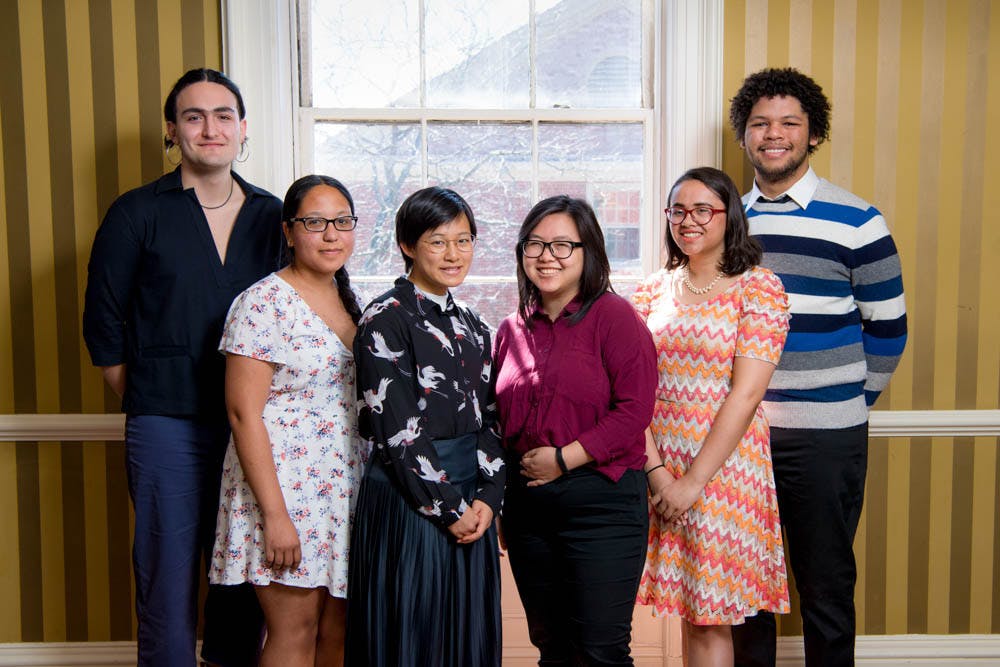Last week, six sophomores from the University were awarded the Mellon Mays Fellowship, which seeks to increase the representation of minorities among higher education faculty, said Asabe Poloma, associate director of the Mellon Mays Undergraduate Fellowship program at Brown and assistant dean for international students. Fellows will have the opportunity to conduct original research over the next two years under the supervision of a University faculty member, she added.
Fellows also receive stipends for their research. In addition, if they enroll in an “eligible Ph.D. program within three years of graduating from Brown,” fellows can “receive up to $10,000 in undergraduate loan repayment from the Mellon Foundation,” according to the University’s webpage on the fellowship.
This year’s cohort is comprised of Elijah Broussard ’20, Xe Chang ’20, Jessica Jiang ’20, Nikki Locklear ’20, Sebastián Niculescu ’20 and Mariela Pichardo ’20.
The University’s faculty advisory board, which reviews applications and selects fellows each spring, sought students in good academic standing who were considering a concentration in a Mellon-designated field of study, Poloma said. The board also looked for students who had demonstrated dedication to research and to the objectives of the program, she added.
“The Mellon Mays Fellowship signaled to me that academia was an option and that I didn’t have to compartmentalize my passion for history into something else,” Locklear said. Locklear, a history concentrator, will be using the fellowship to study the cultural and historical narratives of Native Americans in the southeastern United States, with a particular focus on the Lumbee tribe of North Carolina.
“The Lumbee tribe in particular is fascinating because even though there is this strong cultural narrative, there are so many silences in the historical record where things just have not been recorded or have been manipulated or twisted by outside factors,” Locklear said.
Winning the fellowship was encouraging because “it felt like my work up to now has been recognized ... it feels like other people also see it as important,” said Niculescu, a Brown/RISD dual degree student who will use the fellowship to research the performances of trans and queer women of color. The project will use “that as a way to think about broader coalitional politics and … how communities of color have to encounter each other and face each other,” Niculescu said.
Other fellows in the program will be researching a wide array of issues connected to their academic interests. Broussard is interested in researching the cult of the Egyptian goddess Isis in Rome from 100 B.C.E. to 100 C.E., he said. Broussard hopes his work can help push back against the growing misuse of classics in the alt-right movement.
“I’m really interested in people who cross borders,” said Chang, who hopes to use her fellowship to research community-based tourism in the United States and China.
Over the next two years, Pichardo, another fellow, will study the relationships between Dominicans and Dominican-Americans through bachata, a popular form of guitar music that originated in the Dominican Republic.
Created in 1988, the Mellon Mays Fellowship is funded by the Andrew W. Mellon Foundation, which began the program to encourage underrepresented undergraduates to pursue higher education and enter academia, Poloma said. Since the University joined the program in 1992, over 100 Brown students have become Mellon Mays Fellows with several going on to teach at the University, she added.
The recently selected cohort will begin their research this summer and hold workshops together next semester, Poloma said. “They’re all absolutely brilliant and passionate and committed scholars. … I’m just thrilled to bear witness to their formation as even more critically engaged scholars,” she added.





